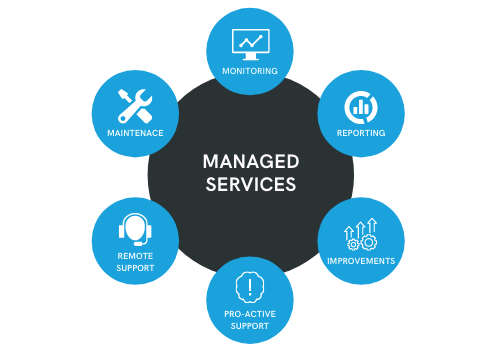In the realm of IT (Information Technology), there are a lot of complex and repetitive tasks involved in managing the infrastructure and end-user systems. In the past, companies used to manage everything by themselves, from software and hardware to networking components.
However, businesses need to focus more on enhancing their services instead of worrying about tech problems. More and more businesses now hire managed service providers (MSPs) to outsource certain IT-related activities instead of doing it themselves.
But what is an MSP? An MSP monitors and manages an organization’s IT infrastructure and other end-user systems.
As businesses worldwide realize the importance of cloud computing, cloud service providers (CSPs) and cloud managed services are gaining popularity.
But what is a CSP? A cloud service provider delivers on-demand cloud computing resources via the internet from remote servers. Using cloud managed services reduces costs, enhances security, and prevents data loss. Working with a managed cloud service provider also ensures automatic network infrastructure upgrades.
In this article, we’ll provide a MSP definition and definition of CSP and answer the questions, “what is a managed service provider?” and “what is a CSP?” We’ll also cover other key concepts, such as MSP technology, MSP program, CSP program, integrated cloud, cloud integration platform, and more.
Let’s start with the basics – what does MSP mean or what is a MSP?
What Is A Managed Service Provider?
Managed Service Provider definition: The term managed service provider, or MSP, is usually associated with outsourced IT services. A managed services provider is a specialist third-party provider that manages and maintains an organization’s IT infrastructure, network, and end-user systems. Managed IT service providers deliver services remotely and assume full responsibility for those services.
The services provided by managed IT service providers are usually cheaper than managing those services in-house with the dedicated staff and equipment. However, managed service provider pricing depends on the range of services you choose. Small and medium-sized businesses with limited IT staff use MSP services.
Organizations looking to free up employees for other important tasks also hire an IT managed service provider. When organizations hire a managed IT service provider, they don’t have to worry about troubleshooting IT-related problems or system downtimes.
Examples of Managed Service Providers
Managed service provider examples include large well-known companies such as Accenture, IBM, Ericsson, Fujitsu, Cisco Systems, Lenovo, DXC, and HP Enterprise Development. An example of an MSP white-label service provider is HashRoot, which builds custom software solutions for companies to manage healthcare information, online learning, finance, and more. A white-label service is a service that a business purchases from a company and presents to customers as its own service.
Services Provided by an MSP Company

Image source
Some MSP companies provide one specific IT service. For instance, a managed security service provider delivers specialized services like intrusion detection, firewall administration, virtual private network, vulnerability scanning, etc.
The best MSP providers can completely replace the IT department of an organization by using the most comprehensive suite of MSP tools and providing a full range of services. Hence, evaluating a managed service provider is essential to see whether it offers the services and MSP tools that your company needs.
A comprehensive MSP solution offers the following services:
- Setting up, managing, and maintaining IT infrastructure
- Cybersecurity services for IT systems
- Management of users’ access accounts on the organization’s systems
- Support services like troubleshooting, technical support to employees, etc.
- Managed hardware outsourcing and managed software and cloud configurations
- Employees’ onboarding and offboarding
- Maintaining networks
- Performing upgrades to systems automatically
Benefits of an MSP Platform
Top managed service providers offer the following benefits:
Constant Monitoring
The best managed service providers monitor hardware, software, apps, network, and security constantly to ensure there are no technical issues. In case any issues occur, the managed service provider solves them. An efficient managed service provider also constantly assesses a company’s current and future IT needs.
Ability to Focus on Company Goals
Top IT managed service providers efficiently manage IT-related services and processes for their clients. MSP solutions allow them to focus on other crucial aspects of their business, such as improving employees’ productivity and enhancing services and products.
Professional Services
An IT expert working in a company usually cannot solve every IT issue. Thus, companies would need to hire several employees with expertise in different areas of IT to solve each issue. Alternatively, they can hire IT service providers that have highly skilled personnel for every IT-related task.
Disaster recovery
Data is precious for every organization, big or small. Enterprise managed service providers can create an efficient disaster recovery plan to avoid data loss in case of a disaster with more expertise than a company doing so in-house.
Cost reduction
An MSP model is based on a monthly fee or subscription-based MSP licensing. Managed service providers deliver services to multiple organizations instead of just a single business. As a result, the costs of MSP services are usually less than what an individual IT expert charges.
What Is a Cloud Service Provider (CSP)?
CSP Definition: A cloud service provider is a third-party service provider that offers cloud-based services, computing resources, infrastructure, and storage. In other words, cloud providers can offer public clouds or manage private and hybrid clouds.
There are different types of cloud service providers, including public cloud service providers, private cloud service providers, hybrid cloud service providers, and bare-metal cloud providers. Some advanced cloud services providers also offer web services such as: managed K8s, managed containers, a Kubernetes marketplace, and more.
There are also cloud migration service providers that help businesses migrate from on-premise servers to the cloud. Multiple companies can share one public cloud, but the data and information of each organization are isolated. In a private cloud, on the other hand, the hardware, computing resources, servers, and storage are dedicated to only one organization.
A hybrid cloud environment is a combination of public and private cloud and on-premise integrations. A public cloud computing services provider delivers on-demand services. This means businesses only have to pay for the services they need. In addition to affordability, providers of cloud services offer several other benefits, such as better speed, scalability, and flexibility.
CSP Examples
The biggest global cloud service providers include Google Cloud Platform (GCP), Amazon Web Services (AWS), and Microsoft Azure. Other cloud providers such as Oracle, Alibaba, Huawei and others also offer cloud services.
Another example is Ridge, which provides an alternative to the public cloud, allowing businesses to deploy on any infrastructure in any location. Businesses can integrate the Ridge platform into on-premises servers, private data centers, edge micro-centers, and multi-facility hybrid environments.
Services Provided by Public Cloud Service Providers

Image source
Public cloud computing service providers offer three main cloud computing services:
IaaS
IaaS stands for Infrastructure-as-a-Service. It is a cloud computing service where a third-party company delivers resources, such as storage, virtual private servers, and networking, to an organization over the internet. IaaS services are referred to as cloud infrastructure services, and they are useful for all types of businesses.
PaaS
PaaS stands for Platform-as-a-Service. In this cloud computing model, a third-party company delivers software and hardware tools, like source code editors and compilers. Developers use this service to write and edit code efficiently.
SaaS
SaaS, the most common cloud computing service model, stands for Software-as-a-Service. It is a cloud-based, fully ready-to-use software. In SaaS, a third-party cloud service provider hosts and manages applications.
If you want to learn more about these cloud computing services, check out our article on IaaS, PaaS, and SaaS.
Managed Cloud Services
Managed cloud services refer to the complete or partial cloud management on an organization’s cloud platform. These services include migration, security, optimization, configuration, and maintenance. Simply put, cloud managed services mean outsourcing cloud management to a third-party service provider. These third party providers are managed cloud service providers who help organizations with their cloud strategy.
Managed cloud services help ensure that the cloud resources of an organization run efficiently. By hiring managed cloud service providers (MCSPs), businesses can also minimize costs and simplify system upgrades. Organizations do not have to hire their own cloud trained IT specialist, but can rather outsource their cloud dealings to a MCSP.
Businesses work in collaboration with MCSPs to choose the right service provider. MCSPs analyze the client’s applications and data to determine the best cloud computing resources for the client.
MCSPs can guide their clients to have a private cloud, hybrid cloud, utilize an edge location or fully migrate to the public cloud. For example, if businesses want to keep some of their servers in the security of their own property (as a highly secured business like a bank or hospital might), an MCSP would help them either maintain a private cloud, or move some of the less sensitive data to a public cloud, thus creating a hybrid cloud.
Other businesses may need to have a server in a specific location, such as a factory or POS (point of sale). For this, an MCSP would guide this business in using an edge cloud. For businesses with no specific requirements, they simply might utilize the MCSP to help them connect and configure their applications to run on a large public cloud provider.
Benefits of Cloud Managed Services
Optimization
Cloud managed service providers help organizations identify the best services for their business operations. They also help you configure services in a way that optimizes performance and minimizes costs.
Cloud Integration Solutions
Good MCSPs provide cloud platform integration tools and offer incredible cloud integrations. Cloud integration services include:
- Cloud data integration
- Cloud application integration
- Cloud-to-cloud integration
- Hybrid cloud integration
- Cloud and on-premise integration
- Cloud API integration
For further benefits, read our blog on the benefits of cloud computing for MSPs.
Expertise and Cost Savings
Businesses working with a cloud managed service provider get on-demand access to professional IT cloud services. Highly skilled experts help their clients achieve their business goals by providing strategic guidance for the business’ cloud strategy.
Disaster Recovery
Good MCSPs provide efficient disaster recovery plans to prevent data loss. They help companies recover data quickly in case any disaster occurs.
Automatic Upgrades
A cloud managed service provider monitors systems continuously and performs upgrades as needed.
Cloud Integration Services
Cloud integration refers to combining multiple cloud-based systems to form one integral system. With a cloud-based integration platform, you get cloud integration tools like cloud data integration tools and cloud integration systems. Cloud-based integration services or cloud integration services include different services, such as cloud integration automation services.
For efficient cloud integration, you need to have a solid cloud integration strategy and effective hybrid cloud integration patterns. Examples of cloud integration platforms include JitterBit, Zapier, Dell Boomi, and more.
Frequently Asked Questions (FAQs)
What is an MSP?
MSP stands for Managed Service Provider. Managed service providers meaning is that a company outsources different IT services and tasks to a third-party company. Simply put, MSP means that a third-party provider delivers IT services, such as infrastructure, network, and security management, to an organization.
Why use a managed service provider?
An MSP offers cost savings, disaster recovery, professional expertise, system and network monitoring, and automatic upgrades. There are different types of MSPs, depending on the services they provide. These include cyber security managed services providers or MSP cyber security, managed network services providers, enterprise MSP, etc.
What is cloud integration?
Cloud-based integration or cloud computing integration simply means connecting different cloud environments. It involves connecting a variety of applications, processes, IT systems, and data repositories to form one unified and efficient cloud deployment.
What is a CSP / What are cloud service providers?
A cloud computing service provider offers cloud-based services, computing resources, infrastructure, and storage. Hence, CSP meaning is that an organization utilizes the services of a third-party cloud provider. The biggest cloud service providers include Amazon’s AWS, Microsoft Azure, and Google Cloud Platform.
What is the difference between MSPs and CSPs?
Managed service providers are responsible for managing all of the tech needs of an organization. Meanwhile, CSPs are specifically responsible for providing cloud services for their clients, such as IaaS, PaaS and SaaS. MSPs very well may offer cloud services as well, and can even be called a CSP in that regard.













